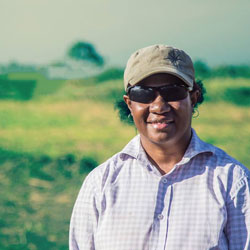

RESHAPING AGRICULTURE FOR BETTER NUTRITION –
The Agriculture, Food, Nutrition, Health Nexus
13-14 August 2018, Canberra

Philmah Seta Waken
 Philmah has six years experience working in research and development activities, working mainly with vegetables, promoting sustainable production and community gene-banks with farming communities in Papua New Guinea (PNG). She is an agronomist with the Papua New Guinea National Agricultural Research Institute, and is a passionate advocate for agriculture in PNG, especially working with young people and women from rural areas.
Philmah has six years experience working in research and development activities, working mainly with vegetables, promoting sustainable production and community gene-banks with farming communities in Papua New Guinea (PNG). She is an agronomist with the Papua New Guinea National Agricultural Research Institute, and is a passionate advocate for agriculture in PNG, especially working with young people and women from rural areas.
Ms Waken graduated with a Bachelor’s degree in Agricultural Science from the Papua New Guinea University of Technology and is currently enrolled in a Masters in Agricultural Science Degree Program with the University of Queensland.
Behavioural change for better nutrition in Papua New Guinea
Abstract
There is a decline in the consumption of traditional vegetables in PNG, which adversely affects family nutrition and is increasing the rates of obesity. Traditional vegetables are more climatically adapted to PNG, require lower inputs, and are superior in food value when compared to globally popular vegetables. They have higher essential nutrients, and historically provided a large proportion of the daily protein, vitamin and mineral intake in the village diet. Turning around the decline in consumption and supply of traditional vegetables will improve food and nutritional security. This is particularly true for remote and isolated communities, and poor urban populations.
Our research found that people lacked awareness of the nutritional value of traditional vegetables. People consider these vegetables as ‘backward’ and ‘poverty’ food, but conversely traditional vegetables connect strongly to culture and ‘home’.
We trained smallholder farmers to manage pests and diseases and save the seeds of traditional vegetables to reduce their input costs. We worked with families and communities to increase their awareness of the nutritional value of traditional vegetables. We trained families in gardening and cooking so they could grow and cook a variety of nutritious food from their own gardens. We created fresh recipes for local vegetables.
Next, we plan to work with maternal-child clinics linked to hospitals where mothers learn to make nutritious cheap food from their own gardens. We will run school-based programs involving teacher education, school gardens and incentive based lunchboxes. Some growers have applied their seed saving skills to setting up small-scale seed businesses.